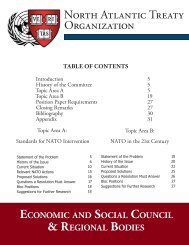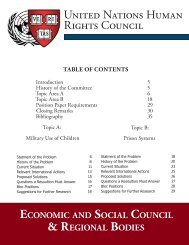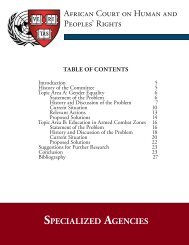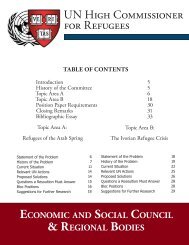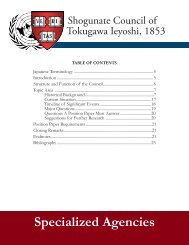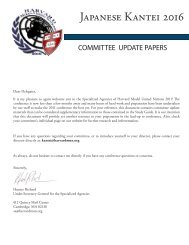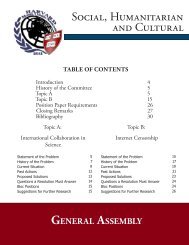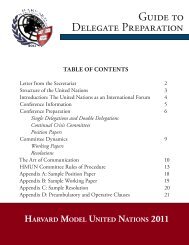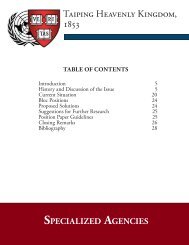World Trade Organization - Harvard Model United Nations
World Trade Organization - Harvard Model United Nations
World Trade Organization - Harvard Model United Nations
You also want an ePaper? Increase the reach of your titles
YUMPU automatically turns print PDFs into web optimized ePapers that Google loves.
<strong>World</strong> <strong>Trade</strong> <strong>Organization</strong><br />
the process of capturing tuna was at the center of the<br />
trade debate. According to the US Marine Mammal<br />
Protection Act, the US government must embargo all<br />
tuna from a certain country if that country can’t prove<br />
that it meets dolphin protection standards set by US law.<br />
The country in question was Mexico. The US banned<br />
imports of Mexican tuna to discourage the harming of<br />
dolphins during the process of tuna fishing. The GATT<br />
panel ruled against the US, saying it could not ban<br />
Mexican tuna simply because of the way it was produced.<br />
Another important conclusion of the panel was that no<br />
country is allowed to use trade measures to enforce its<br />
own domestic laws in foreign countries. Although this<br />
was a disappointment to environmental advocates, the<br />
opposite ruling would have set a dangerous precedence.<br />
Any country would be able to say that a foreign country<br />
was violating its own domestic environmental laws and<br />
the country would be able to enact trade penalties in<br />
“retaliation.” 62<br />
Subsidies<br />
Legal complications with environmental policies<br />
illustrated by national treatment and process-product<br />
problem also extend to subsidies in international trade<br />
policy. Before explaining how subsidies can often conflict<br />
with environmental protection, it is important to first<br />
elaborate on the nuances regarding subsidies. 63<br />
There are traditionally two types of subsidies: export<br />
subsidies (which are applied to only exports) and general<br />
subsidies (which are applied to all goods produced in the<br />
country, whether exported or consumed domestically).<br />
Historically, international trade agreements have placed<br />
more restraint on export subsidies. 64<br />
Subsidies can have a few different types of impacts on<br />
international trade. The first impact is on the importing<br />
country. Because the goods coming into the importing<br />
country are often cheaper due to the subsidies, the<br />
importing country’s own goods are at a disadvantage.<br />
International rules often allow the importing country to<br />
impose a “countervailing duty” to offset this effect. In<br />
essence, it is allowed to put a tariff on the subsidized<br />
goods. Another impact of subsidies is inhibiting imports<br />
into a subsidizing country. The importing country can<br />
subsidize domestic producers, which allows domestic<br />
producers to lower prices and beat out imports. 65<br />
Now how do these concepts apply in the<br />
environmental debate? The definition of subsidy has not<br />
been very well established. While subsidies could come<br />
in the traditional sense of monetary aid or tax incentives,<br />
they can also come in other forms. For example, suppose<br />
an exporting country lacks strong environmental<br />
regulation and exports goods to a country with strict<br />
regulations. Can the importing country argue that the<br />
lack of strong environmental regulation is a “subsidy”<br />
that the exporting country provides, resulting in unfair<br />
competition? This issue has come up in various conflicts<br />
between Mexico and American/Canadian producers<br />
in regards to the NAFTA treaty. Similarly, suppose an<br />
exporting country gives domestic manufactures tax<br />
breaks for setting up plants that are more environmentally<br />
friendly. When those goods are exported, the importing<br />
country could justifiably impose countervailing duties<br />
due to the subsidized nature of those goods. 66<br />
Exports and Competitiveness<br />
Supporters of trade liberalization often argue<br />
that a country’s competiveness is compromised by<br />
environmental rules and standards. If an exporting<br />
country has strict environmental standards and rules<br />
that producers must meet, then those producers must<br />
factor those costs into their price structures. The prices<br />
they charge will consequently be higher, placing them at<br />
a disadvantage when competing with another exporting<br />
country that does not have strict environmental<br />
regulations. In the minds of the environmentalist country,<br />
it is unfair for them because they have to bear a financial<br />
and economic cost for contributing to environmental<br />
compliance. 67<br />
In some ways, the conflict between environmental<br />
policies and trade liberalization is similar to other<br />
problems resulting from differences in society. For<br />
example, countries with lax worker safety laws and lower<br />
minimum wages could also be said to have an unfair<br />
competitive edge in exports. These kinds of differences<br />
will also be present from society to society. Thus, one<br />
issue that needs to be addressed is whether environmental<br />
policies are substantially different from other policies<br />
regulating minimum wages, worker safety, and others. If<br />
environmental policies are, then they must be considered<br />
in a special manner within the world trading system. 68<br />
Relationship between MEAs and the WTO<br />
Multilateral Environmental Agreements (MEAs)<br />
have historically been the best solution to resolving<br />
potential trade and environment conflicts. However,<br />
these agreements often come in conflict with the<br />
international system of trade rules established by the<br />
WTO. These conflicts result due to the trade-related<br />
provisions in MEAs that help countries achieve their<br />
18<br />
Specialized General Assembly Agencies




